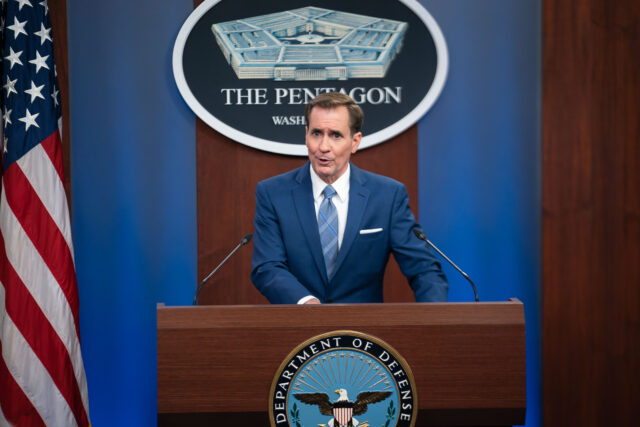
The White House, clearly, is watching once-steady constituencies slide away, expressing doubts about administration policy.
But not everything is about Michigan.
The current one-step, two-step on Gaza and Israel in the United Nations is about the Biden administration’s world view. China and Russia vetoed the U.S. sponsored Security Council Resolution on Gaza precisely as the State Department planned. The U.S. had put two “poison pills” in it: condemnation of Hamas for its crimes against Israel, and linkage between a ceasefire and release of Hamas’ Israeli hostages, some of whom are American citizens.
After mild criticism of Russia and China, the U.S. sat back while a resolution was put forward by the non-permanent members on Monday. The new version called for an immediate and permanent ceasefire and contained no condemnation of Hamas. To the extent that hostages are mentioned, negotiations for their release would come after the ceasefire. The U.S. kept its veto in its pocket and abstained.
National Security Council spokesperson John Kirby told reporters after the vote: “Our vote does not, and I repeat, does not, represent a shift in our policy.”
Oh, yes it does. And it doesn’t.
The fact that the U.S. took Israel to the Security Council to demand compliance is itself a huge shift in policy. The UN’s list of egregious condemnations of Israel and support for terrorists that attack Israel is well-known.
Furthermore, the U.S. abstention is a change. There is no coupling of countries on the Security Council with which Israel could work to create a secure situation in Gaza for itself or for Palestinian civilians – which requires removing Hamas. The non-permanent members are too small, too far away, uninvolved in the region, or hostile. Two of the five permanent members – Russia and China – are on Iran’s side; the United Kingdom has taken a virulently anti-Israel position, likely based on domestic considerations; and France, well, France.
The only consistent protection Israel had from the broadly anti-Zionist, antisemitic, anti-Western, anti-American, anti-democratic United Nations was the United States. Until now.
So, Adm. Kirby is wrong. But, in another way, he is correct.
As Hamas leader Ismayil Haniyeh popped off from his haven in Qatar for his second visit to Iran since 10/7, the abstention should be understood in the context of Biden administration policy toward the mullah regime in Iran beginning in 2021.
- Separating the U.S. publicly from the government of Israel has long been a goal of Iran. This helps.
- Offering Iran’s lapdog Qatar control of the U.S.-planned “pier” in Gaza that will be built by Qatar’s Hamas construction company, which will then control what comes through the pier. This helps ensure the survival of Iran’s lapdog Hamas and its future in governance.
- Unfreezing funds for Iran and the continuation of waivers to allow Iran to sell oil – mostly to China. Even after 10/7, the U.S. extended the oil sanction waivers, and declined in November to veto the expiration of the UN embargo on Iran’s production and sale of ballistic missiles.
- Delisting the Houthis as a terror organization in 2021, allowing it to receive Iranian weapons and support goes along with the tepid U.S. response to Houthi aggression in the Red Sea, including attacks on merchant ships and the cutting of undersea cables. A US spokesman acknowledged, “‘Iranian-provided tactical intelligencehas been critical in enabling Houthi targeting of maritime vessels’ … adding that the drones and missiles the Houthis have been using were also provided by Iran.” Iran also sells drones to Russia – which uses them against US ally Ukraine. There has been no U.S. response.
- Promoting the Palestinian Authority (PA) as the future ruling party in Gaza despite the announcement that nearly 700 Hamas terrorists would be paid for their participation in 10/7 under its “pay for slay” program. In July, the White House bragged that it had given more than $315 million to the Palestinians in 2023 — and nearly a billion dollars since the administration took office.
- Signing a maritime border deal with Lebanon and a separate one with Israel (Lebanon wouldn’t sign a document Israel signed) that will fund Lebanon’s Iranian proxy Hezbollah government.
- Failing to condemn Iran’s treatment of its own population, including the execution of 834 people in 2023, a 43% increase over 2022; including at least 25 women and two children. Another 28 people were executed this past January.
- Publicizing a presidential statement for the holiday of Nowruz that promotes U.S. assistance for Palestinians in Gaza. Arab Palestinians do not celebrate Nowruz, and the Iranian people have been protesting Iranian support for Palestinians.
There aren’t enough votes in any state in the Union to produce this list.

